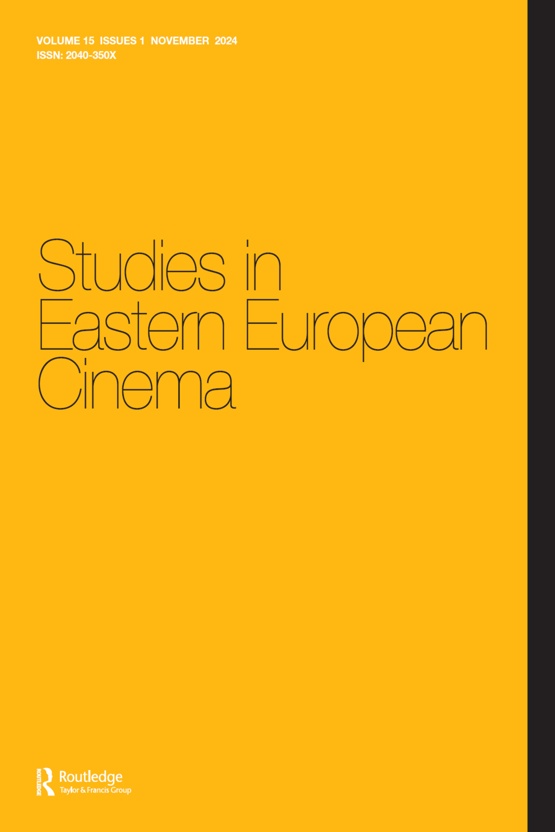Submit a Manuscript to the Journal
Studies in Eastern European Cinema
For a Special Issue on
City, Cinema and Media
Abstract deadline
06 March 2024
Manuscript deadline
31 August 2024

Special Issue Editor(s)
Lina Kaminskaitė,
Art History and Theory Department, LMTA, Lithuania
[email protected]
Chris Berry,
King‘s College London
[email protected]
Anna Estera Mrozewicz,
Lund University, Sweden
[email protected]
City, Cinema and Media
Studies in Eastern European Cinema Journal and 8th edition of the Baltic Sea Region Film Conference invites to propose papers for special issue City, Cinema, and Media.
In the light of global processes such as climate change, militarization and geopolitical reshufflings, a city is both a backdrop and an active participant in ever-evolving ways of mediating the transformation of conditions for human and non-human dwellers. Films such as Mariupolis 2 (dir. Mantas Kvedaravičius and Hanna Bilobrova, 2022) and Burial (dir. Emilija Škarnulytė, 2022) capture personal urban experiences and transformations of infrastructures. As we witness the new forms of audiovisual mediation enter our public and private spaces, our call invites the researchers to collectively reflect about them. Studies in Eastern European Cinema Special Issue City, Cinema, and Media focuses on the cinema and urban space, engaging with questions of representation, distribution, exhibition and audience, as well as intersections of urban, cinema and media studies within Eastern European, East-Central European, Baltic and Balkan contexts.
Historically, cinema’s connections with the city have been referred to as chemistry between “celluloid and asphalt.” In classical film studies, both the city and cinema have been analyzed through frameworks of modernity. However, today when we think about moving image and a city, we also think about a pixel and forms of data representation, and digital and global interconnections. Contemporary urban and cinema studies demonstrate how productive such interdisciplinary approaches are. The crucial changes in moving image technology (the digital turn) and global urbanization have brought the remarkably productive spatial turn into cinema and screen media studies, for example New Cinema History engagement with the experience and memory of cinema watching place. By now it is widely accepted that cinema is not only a temporal but also a particularly spatial form of media which both organizes the spatial imaginaries inside the frame and at the same time actively renders space through film production, distribution and exhibition.
- Possible topics may include, but are not limited to:
- Cinema heritage and urban cultures;
- Cinematic urban genres, tropes and narratives;
- Cities in audiovisual imaginaries;
- Urban visions and visualizations in moving image, urban architecture in audiovisual media;
- Urban soundscapes in audiovisual media, including television and video games;
- Urban place and space in audiovisual media, including television and video games;
- Home in the city – cinematic representation of public and non-public spaces;
- Screen cultures in public and private urban spaces;
- Film exhibition infrastructure, cinemas in cities, audiences and distribution practices in cities;
- Role of film festivals in film and urban cultures;
- Digital city and city as a global film-set;
- Urban representations of disasters, war and conflict in film;
- Queering the city in film;
- Feminism and city in film;
- Body and urban space in film;
- Film archives as urban infrastructures;
- Security cameras in public and private urban spaces;
- City and ecosystem in moving image;
- Urban environmental media;
- City and securitization discourse in film;
- City, design and fashion in film;
- Cities as cinematic body doubles;
- Audience engagement through urban spaces and temporalities;
- Decolonizing the urban space in/through film and media;
- Decolonial methodologies in cinema and media studies;
- Expanded cinema and live cinema in the digital age.
Looking to Publish your Research?
Find out how to publish your research open access with Taylor & Francis Group.
Choose open accessSubmission Instructions
Please send abstract proposals (250-300 words) and a short biography (50 words) to: [email protected], [email protected], [email protected]. The deadline for finished articles is 31 August 2024.